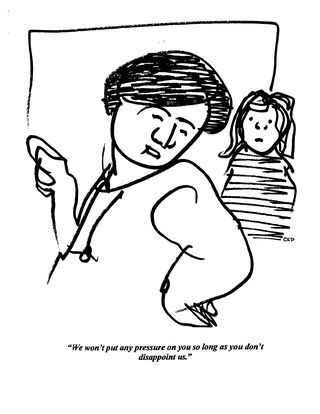Grief
Parent, Adult Child, and Reconciling Past Unhappiness
When past hardship obstructs moving on, reconciliation counseling may help.
Posted February 28, 2022 Reviewed by Davia Sills
Key points
- Between parents and a growing teenager, there will be normal times when each feels hurt by what the other did or did not do.
- In most cases, these insults and abrasions are treated as part of the normal trials of getting along, and so are let go.
- On occasion, however, there are experiences of deep hurt from each other that are hard to let go, that stand in the way of happily moving on.
- Sometimes reconciliation counseling can help both parties bridge what happened with understanding and appreciation.

There is no perfect child or parent. There is no perfect childhood or adolescence. There are only parents and teenagers relating the best they can, gradually becoming increasingly independent of, and different from, each other as they grow apart.
In the course of this necessary separation and redefinition, misunderstandings and mistakes will occasionally cause one or both parties to end up feeling injured or offended. “That really hurt!”
Types of offenses
Mostly these offenses are of minor and passing impact. “When you came home late from work, you could be really impatient to live with.” “When you got busy with friends, it could be really hard to get your attention.” There were lots of normal trials of day-to-day getting along. No big deal.
However, in some cases, there can be harder stuff that happened. Short of ongoing abuse, I mean, where there were some impulsive words or damaging actions that the parent or adolescent wishes they could take back or could have done differently.
These are occasions where the painful past is unhappily present between them and can still arouse hard feelings when remembered. “I wish you hadn’t stolen money from us and made everyone feel so unsafe!” “I wish you hadn’t divorced and broken up the family!” There can be lingering regret and remorse on both sides: “I wish our life together had played out differently!”
Feeling stuck
For the departing adolescent and the deserted parent, it can be hard to move forward with each other when one is still sorely tied to the past. They are at a redefinition point in their relationship.
What to do? They might be able to free themselves from the hold of former suffering by engaging in the process of reconciliation. This requires letting go of old unhappiness with forgiveness of self and of other (of guilt and resentment) and holding on to the value of their own and each other’s past and ongoing contributions to the relationship (of gratitude and support) with appreciation.
Grievance and grief
Over the years, when I was still in private practice, I would occasionally do reconciliation counseling for a strained parent/adult-child relationship. The goal was to help the aggrieved parties get unstuck from pain and start to build a working foundation for moving on. To this end, I tried to help them understand the difference between talking about grievance and talking about grief over whatever had unhappily happened.
I suggested that when talking about grievance at offense and feeling wronged, it is easy to focus on resentment and to cast blame, often encouraging the other person to make a defensive response: “Well, what about all the harm you did?”
When talking about grief from pain about what happened and feeling hurt, however, it is possible to focus on injury, perhaps encouraging the other person to make an empathetic response: “I didn’t know how damaging this was for you.”
This is the difference between making a critical or a compassionate response, one that shuts communication down or opens it up.
Goals of reconciliation
The goals of reconciliation discussions between parent and departing adolescent, who are stuck in a hard emotional place with each other because of lingering unhappiness, were:
- To encourage empathetic understanding between them
- To give grief a full hearing for unhappiness to be expressed
- To honor the hard side of their relationship by hearing painful history
- To now focus on the positive contributions they have made for each other
- To talk about how they wish their relationship would more happily carry on
Between parent and grown child, when past hurts stand in the way of an ongoing relationship, then an attempt at reconciliation, and the final freedom it can give, may be worthwhile to try.


